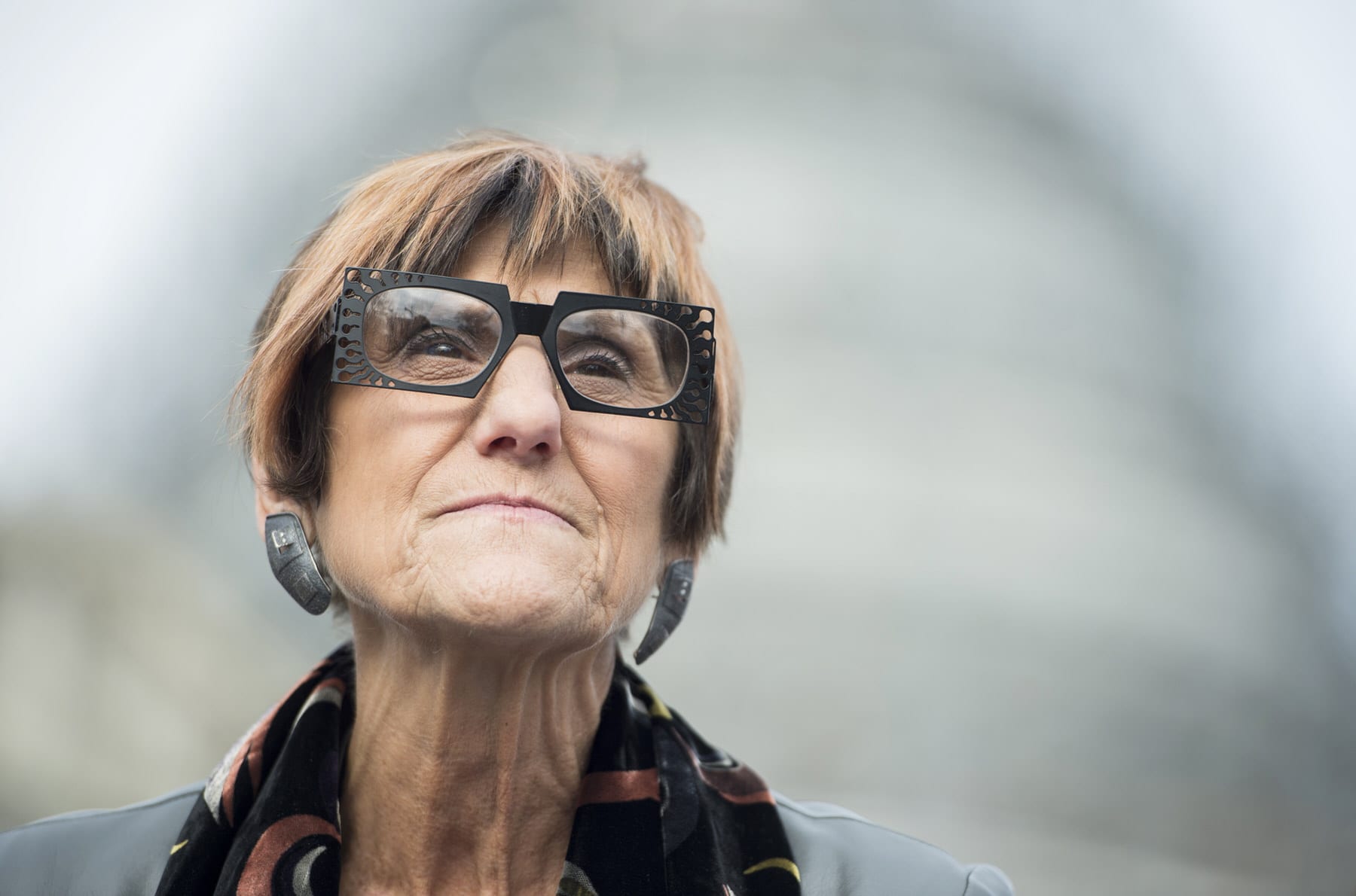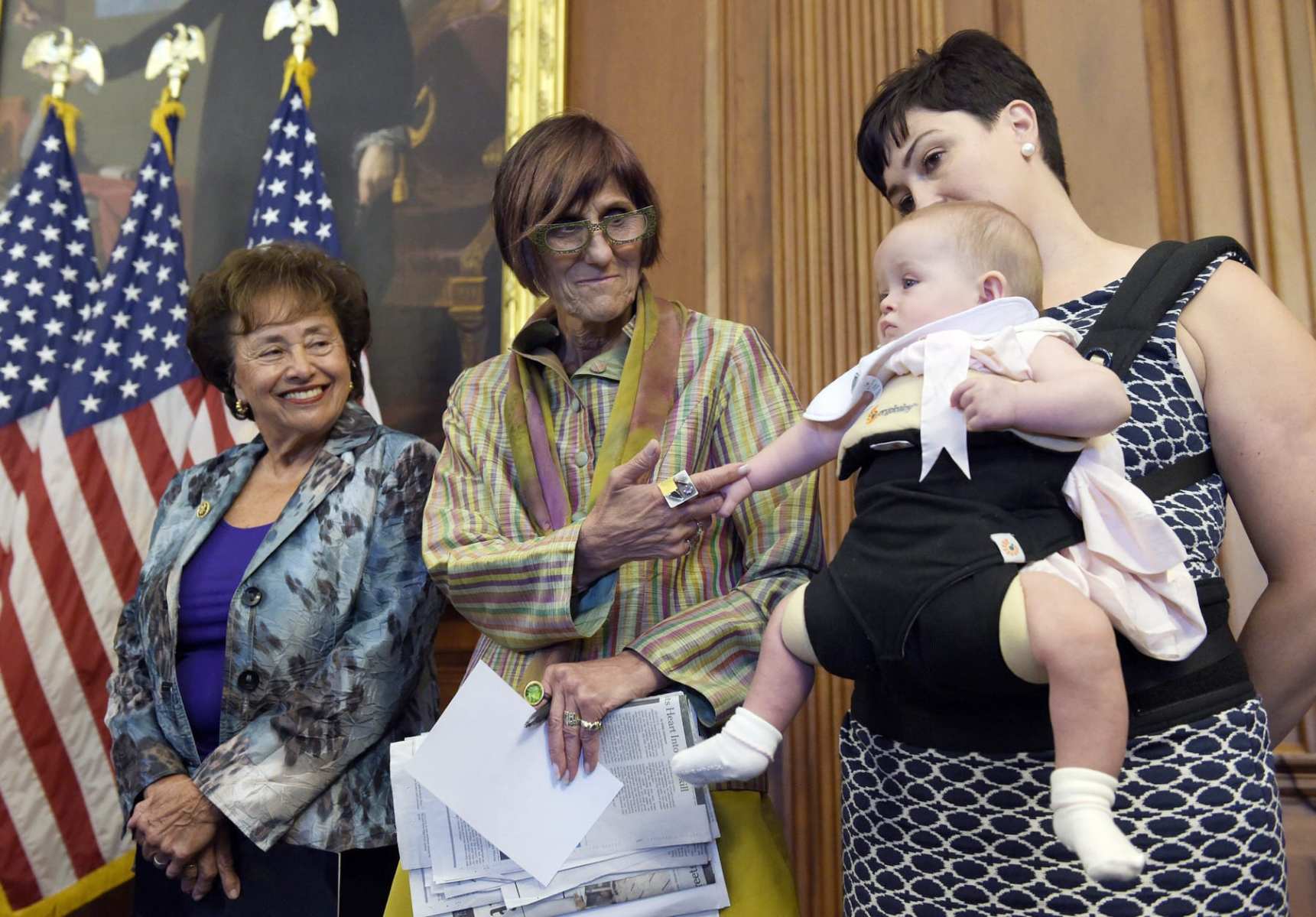She knew the president’s top advisers were drafting a sweeping plan to deliver the nation from historic economic depths, and there was no way, not after an 18-year-long battle to lift millions of children from poverty, that Rosa DeLauro was going to stay out of that.
The Democratic congresswoman from Connecticut called Jared Bernstein, President Joe Biden’s longtime economic advisor, and made it clear that the plan had better include an expansion of the child tax credit to benefit the nation’s poorest families.
“In language that I might describe as ‘somewhat juicy,’ she was very emphatic about her preferences,” Bernstein told The 19th. “One of the things I give Rep. DeLauro credit for is being a relentless champion of the policy — in tough times and in more politically favorable times. She’ll never give up on this idea.”
Since 2003, DeLauro has been pushing at every opportunity for the extension of the credit, an anti-poverty measure that, if expanded, could effectively cut child poverty in half. Created in 1997, the child tax credit leaves out a third of all children from accessing the maximum benefit. And for years, DeLauro was the lone voice on the topic, before it started getting the support of other Democrats, including Sens. Sherrod Brown and Michael Bennet and Rep. Suzan DelBene. More recently, pockets of Republican support have emerged, with the child tax credit expansion getting the attention of Sens. Mitt Romney, Marco Rubio and Mike Lee.
Biden endorsed DeLauro’s plan to grow the credit to cover America’s neediest families in his presidential campaign. But she needed to see it in his coronavirus plan.
About a day after DeLauro called Bernstein, a historic extension to the child tax credit was included in Biden’s $1.9 trillion American Rescue Plan, and DeLauro was within striking distance of a decades-long goal.
The proposal from the Biden administration would expand the credit from a current maximum of $2,000 per child to as much as $3,600 for the youngest children. And, instead of coming in the form of checks deposited annually by the Internal Revenue Service, the checks would instead come every month — $300 monthly for children under 6 and $250 monthly for those ages 6 to 17.
Critically, the credit would be available to the lowest income families. Right now, the credit is tied to a family’s tax burden, so those who have no tax liability after deductions aren’t eligible. About 48 million families benefit from the credit, which phases out for single parents earning more than $200,000 or married couples earning more than $400,000.
Removing the provision that ties the credit to tax liability would make it fully “refundable,” meaning even families who owe $0 in taxes could still get the full child tax credit back. That would help an estimated 27 million children in families that don’t receive the full benefit.
But the Biden plan would expand the credit for a year, and for DeLauro, that’s not enough.
On Monday, DeLauro will reintroduce her legislation, which would make the change permanent. She has introduced it to Congress, in one form or another, about a dozen times before.
But this year is different. As the newly appointed chair of the House Appropriations Committee, she is one of the most powerful people in Congress. DeLauro, who is in her 16th term, also has the ear of her longtime friend and supporter on the cause, Speaker Nancy Pelosi, the benefit of a Democrat-controlled House and Senate, and the support of Biden, with whom she shares a long history.
Public opinion is also in a radically different place than in 2003, when she first fought for refundability and lost on a party-line vote. Expanding the child tax credit now has bipartisan support, said Bernstein, who now sits on the White House’s Council of Economic Advisers, though there are differences about how to structure the change.
There is also something DeLauro didn’t have 18 years ago: a building scientific consensus. The National Academy of Sciences found that while measures to reduce child poverty are costly, they are less expensive than the estimated $800 billion to $1.1 trillion the country loses annually as a result of the negative outcomes of child poverty, including lost productivity, increased costs of crime and increased health expenses. The academy concluded in 2019 that a $3,000-a-year child tax credit could reduce deep poverty by half, leading to better outcomes for children.
It’s always been a moral question for DeLauro, but, particularly since the start of the pandemic, it’s become a more urgent economic one. Women and people of color, the ones most likely to benefit from an extended tax credit, have been the most severely impacted by job loss this year, with unemployment levels topping 20 percent for some groups at the worst of it.
How has the recession affected you? Share your story with the 19th.
“For me, this is a moment I have been working toward, building toward, engaging every ounce of determination,” DeLauro said. “To see it come to fruition — it’s why we come to the institutions [of government].”
DeLauro’s outlook on the role of government was formed at her kitchen table, where her parents would listen to the struggles of low-income families in their New Haven neighborhood, Wooster Square. Her mother worked as a dressmaker in a sweatshop when DeLauro was growing up — it’s what sparked her affinity for bright clothes that set her apart in the monochrome halls of Congress — and her father was an insurance salesman. Both served on the city council, and her 35 years of service there earned her mother, Luisa DeLauro, the nickname “Mayor of Wooster Square.”
“Despite their own circumstances, my folks’ brand of politics was about: What is it the government is able to do for folks?” DeLauro said.
Over her long career in government, DeLauro has earned a reputation for hosting seminars at her house with politicians, scholars, economists and advocates. That’s where Sen. Elizabeth Warren, then a professor researching the coming housing crisis, first got a taste of policy advocacy. And it’s where Warren got introduced to DeLauro’s persistence, something she encounters when the two are working to get policies passed.
“It’s being called at 7:15 in the morning and 11:15 at night and being told who I need to call to make sure we are getting this done effectively on the Senate side,” Warren said.
DeLauro started in Washington in 1979 as chief of staff and campaign manager for then-Sen. Chris Dodd of Connecticut. She became the first executive director of EMILY’s List, the Democratic PAC to elect pro-abortion-rights women candidates, before working on Michael Dukakis’s 1988 presidential campaign and then running for Congress herself in 1990.
For almost that entire time, women and children have been her singular focus. Some of that came from her work with Dodd, one of the founders of the Senate’s children’s caucus in 1983 and the author of the Family and Medical Leave Act.
“How do you explain to people that a member of Congress qualifies for a refundable tax credit but a person who is living under the poverty line doesn’t?” Dodd said. DeLauro understood that, and the two partnered up.
The initial tax credit, passed in 1997, offered $500 annually per child but was largely non-refundable and designed as a tax incentive for middle- and higher-income families. While more parts of the credit have become refundable, and so available to poorer families, the lowest-earning households still can claim only a maximum of $1,400 of the full $2,000 credit.
In 2003, DeLauro started pushing to make the full credit available to the poorest families, swayed by data that was beginning to emerge on the potential impact an expanded credit could have on reducing child poverty.
“I had become the most outspoken voice in the Congress continually advocating for the child tax credit, primarily because I saw it needed to be done and so I did it,” DeLauro wrote in her book, “The Least Among Us,” published in 2011 and updated in 2017. “…But at the time there was no national debate about it — absolutely none.”
Welfare then was focused on incentivizing work, and DeLauro calls her “no” vote on a 1996 restructuring to do just that one of the proudest of her career. Now, Democrats and Republicans are closer than ever to consensus on expanding the credit.
But reaching that consensus has taken time, and it’s often been lonely, DeLauro said. She’s had to become somewhat of a pest by her own admission, repeating herself over and over to make sure the child tax credit was included in the conversation. She learned that from her mother, DeLauro said.
In 1933, Luisa DeLauro wrote in the Democratic Party Newsletter, “We are not living in the Middle Ages when a woman’s position was merely to serve a master in a home. Come on, girls: Let’s make ourselves heard.”
And her daughter has, though her name hasn’t always been included in the story of the child tax credit. More recently, the topic has been most often tied to the male cosponsors on the bills, who have certainly been critical partners in advancing the discourse on the topic. They just haven’t been doing it as long.

“Can it be annoying? Yes,” DeLauro said. “However, we are going to pass the child tax credit and we are going to get it done.”
If it does pass, Warren said, it will be historic — the kind of change that will immediately be tangible for millions of low-wage families.
“This is one of those that people will look back,” Warren said, “and say: ‘That’s when we turned a corner on childhood poverty.’”
Part of the shift toward an expandable child tax credit has come from a better understanding of the nation’s poor. They’re not one fixed group, but in fact a much larger group of people who move in and out of poverty, said Christopher Wimer, the co-director of the Center on Poverty & Social Policy at Columbia University, which has done an analysis of the Biden plan. It’s something made clear by the past year, when suddenly millions of workers plunged into poverty as a result of the pandemic-induced recession.
Expanding the credit, proponents argue, would create a foundation of support for all children regardless of fluctuations in their family situations. Aware of that need, a number of lawmakers have put forth child tax credit plans.
Rep. Richard Neal has drafted a proposal that sets up an online portal for families to update their status, makes the credit fully refundable and sends payments of up to $300 a month. Neal’s proposal sets different thresholds to phase out the benefit, at $75,000 for a single parent — DeLauro’s is $130,000 — and $150,000 for a married couple filing a joint return, versus $180,000 in DeLauro’s bill. Neal’s would be enacted for one year, with payments beginning as soon as July.
The United States spends less on children than most other developed nations, and that spending has remained about flat over the past two decades. Several other countries have expanded child credit programs, including Canada, whose program has been linked to a 20 percent decrease in the poverty rate between 2015 and 2017. The conversation on what commitment the U.S. wants to make to children has been growing.
“It does seem like the momentum has been building behind it,” Wimer said. “It’s not that it’s a new idea because a lot of other developed countries do this. But it was out of the political imagination until someone imagined it.”
Imagination and reality clash, though, when billions of dollars are at stake. Estimates put the price tag of the Biden child tax credit expansion at $120 billion a year.
Rep. DelBene, a cosponsor on the DeLauro bill, said the cost is justified because it helps curb future, higher costs. It’s also a mechanism for racial equality, because the families most likely to be the recipients of the expanded credit are families of color. The current structure of the credit leaves out a third of all children. In Black and Latinx families, about half of all children can’t access it.
Some of the greatest opposition to the expansion of the credit is around the idea of removing the work incentive, though some experts say the money could even promote work by helping parents afford daycare.
Sens. Rubio and Lee, who have supported expanding the child tax credit to as much as $4,500 for young children, said they don’t support making it fully refundable to the lowest-wage families.
“That is not tax relief for working parents; it is welfare assistance,” Rubio and Lee wrote in a joint statement last week. “An essential part of being pro-family is being pro-work.”
The statement was in response to an amendment proposed by Romney last week to expand the credit to $4,200 a year for children under 6 and $3,000 for those ages 6 to 17. The payments would also be monthly and fully refundable, but to pay for it, Romney proposes eliminating other parts of the social safety net, including Temporary Assistance for Needy Families (TANF).
That could be a no-go for many, said Elaine Maag, a principal research associate at the nonpartisan Tax Policy Center. A full restructuring of the social safety net and the removal of a program like TANF, which also provides child care support and job preparation, already has stark opposition.
This is a moment I have been working toward, building toward, engaging every ounce of determination.
Rep. Rosa DeLauro
A larger restructuring is also at odds with Biden and DeLauro’s plan. They want to move quickly, and they’re planning to use a reconciliation process that lets them use the Democratic majorities in the House and Senate to pass a bill without needing Republican support. Biden has said Republican proposals don’t do enough to respond to the crisis.
“What Republicans have proposed is either to do nothing, or not enough,” Biden said in a speech Friday. “All of a sudden, many of them have rediscovered fiscal restraint and the concern for the deficits, but don’t kid yourself. This approach will come with a cost: More pain for more people for longer than it has to be.”
Now, Congress will debate what shape to give the final components of the relief bill, and in terms of the child tax credit, the way forward in the short term, at least, may be the simplest solution, Maag said.
“They want to use a tool that they know isn’t going to unintentionally cause harm to other parts of the social safety net,” Maag said. “The quickest thing to do is to take a program you have and extend it to the population that’s left out.”
Questions remain about how the IRS would manage a shift to monthly payments for millions of families. Treasury Secretary Janet Yellen said during her confirmation hearing that she would work to get monthly distributions “implemented as rapidly as possible” at the IRS.
But despite the reservations, consensus has grown that the expansion is likely on the brink of passage as part of the Biden relief bill and could soon become permanent.
“So many of our social safety nets have been crafted by Democrats and Republicans because they recognize the problem and then they want to solve the problem,” DeLauro said. “That’s why it’s necessary to be dogged because times change, environments change, the players change — there is new perspective, all of which can get you where you wanna go.”
For DeLauro, 77, it feels almost cathartic. She’s watching the birth of her idea, decades in gestation. Reaching this point has come with a deeper realization, too, that cultural shifts are sometimes built in lifetimes, through work, community and, sometimes, conversations around dinner.
A few years ago, the city of New Haven erected a sculpture honoring DeLauro’s family.
It was shaped like a kitchen table.






